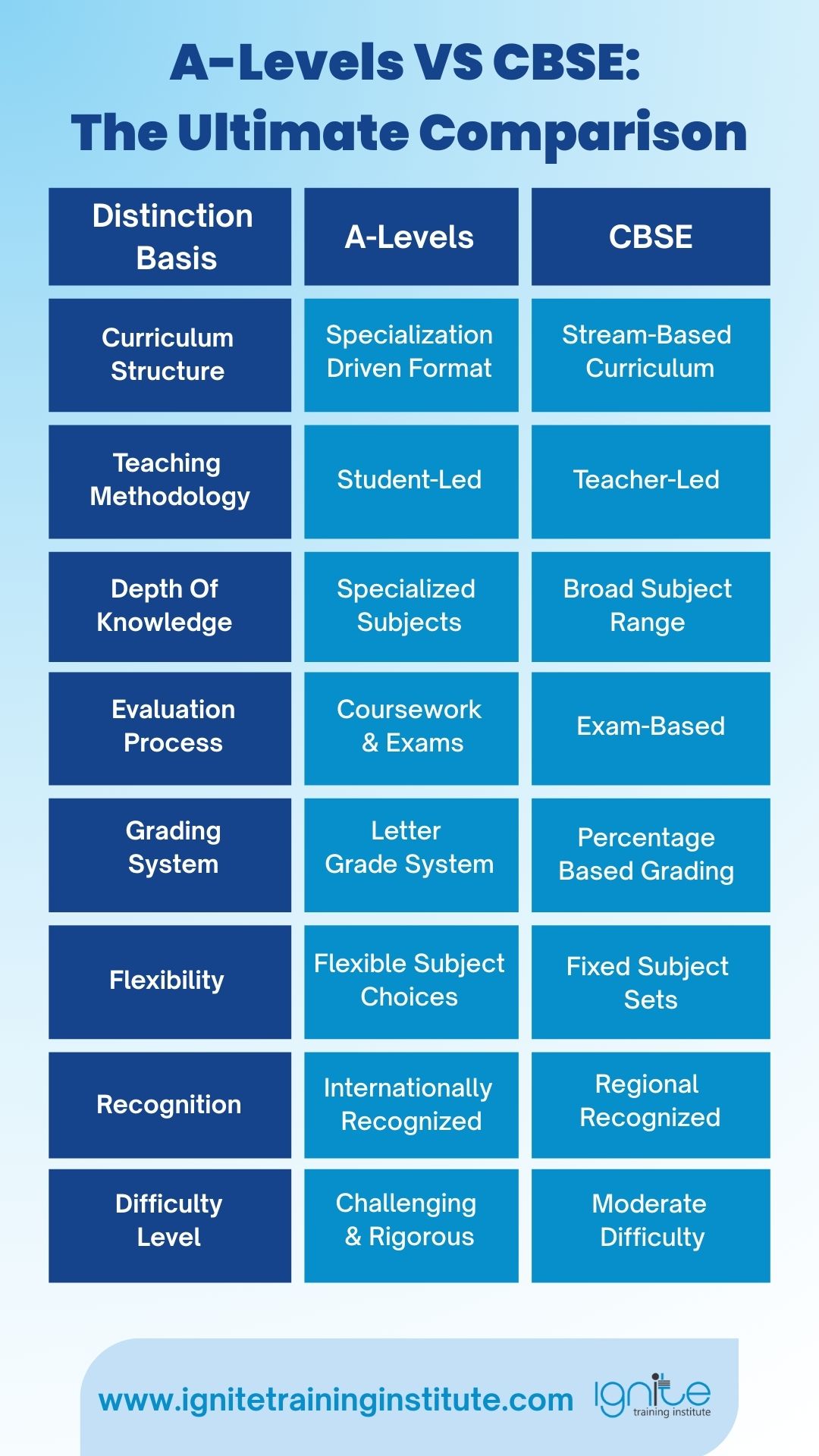When it comes to high school education, there are many curricula and systems to choose from. Two of the most popular and well-known systems are the A-Levels and CBSE. A-Levels or Advanced Levels are an education system used primarily in the UK and other parts of the world, while CBSE, or Central Board of Secondary Education, is an education system used primarily in India.
Both systems have their own unique features, strengths, and limitations, and choosing between them can be a difficult decision for students and parents. In this blog post on A-Levels VS CBSE, we will compare A-Levels and CBSE, examining their key differences and similarities, and helping students make an informed decision about which system is best for them.
Additionally, Ignite Training Institute offers full tutoring support for A-Levels qualifications. Join a free demo class today.
What Are A-Levels Qualifications?
A-Levels, or Advanced Level qualifications, are a type of academic qualification that students in the United Kingdom and some other countries can obtain after completing their secondary education. A-Levels qualifications are highly valued by universities and employers and are considered a standard measure of academic achievement.
As A-Levels are usually taken by students between the ages of 16 and 19, over a two-year period. Students typically choose three or four subjects to study in-depth, with exams taken at the end of the two-year period. There are over 50 subjects available at A-Level, including traditional academic subjects such as English literature, mathematics, physics, and history, as well as more specialized subjects such as psychology, photography, and economics.
These qualifications are graded on a scale from A* (the highest grade) to E (the lowest pass grade). Some subjects, such as mathematics, further mathematics, and physics, also offer an additional grade called an “S-level,” which is above the A* grade.
A-Levels are important qualifications for students who want to go to university, as they are often a requirement for entry into degree programs. Some universities may require specific A-Level subjects or grades, depending on the course of study.
Related: Why It Is Absolutely Ideal To Choose The A-Levels?
What Is CBSE Curriculum?
CBSE or Central Board of Secondary Education is a national-level board of education in India. The CBSE curriculum is a comprehensive education program that covers primary, secondary, and senior secondary education in India.
The CBSE curriculum is designed to provide a balanced education that emphasizes both academic and co-curricular activities. The curriculum is updated periodically to ensure that it meets the changing needs of the students and society. The curriculum is also designed to prepare students for various competitive exams such as the Joint Entrance Examination (JEE) for engineering and the National Eligibility cum Entrance Test (NEET) for medical education.
The CBSE curriculum covers a wide range of subjects, including mathematics, science, social studies, languages, and arts. The curriculum is designed to be student-centered and interactive, with a focus on developing critical thinking, problem-solving, and communication skills. The curriculum also places a strong emphasis on practical learning, with a variety of hands-on activities and experiments incorporated into the teaching process.
Related: IGCSE VS CBSE: Ultimate Comparison With 6 Key Differences
A-Levels VS CBSE: Which Is Better For Students?

When choosing the right curriculum for Grades 11 and 12, students and parents often compare international boards like A Levels with Indian national boards such as CBSE. Both offer distinct academic experiences and pathways, and the right choice depends on a student’s learning style, career goals, and university plans. Here’s a detailed comparison of the A-Level and CBSE curriculums across key aspects:
1. Curriculum Structure
A Levels follow a subject-specific and modular approach typically undertaken in Grades 11 and 12. Students usually select three or four subjects based on their academic strengths and career aspirations. This structure allows for academic specialization and encourages independent learning, making it suitable for students with a clear direction toward university studies or specific career paths.
CBSE, on the other hand, offers a centralized and broad curriculum up to Grade 10. In Grades 11 and 12, students must choose one of the three predefined streams—Science, Commerce, or Humanities. Each stream comes with fixed subject combinations, limiting flexibility but providing a well-rounded base for Indian entrance exams like JEE, NEET, or CUET.
2. Depth Of Knowledge
A Levels emphasize in-depth exploration of chosen subjects. Students often engage with advanced content comparable to first-year university levels, especially in disciplines such as Mathematics, Physics, or Economics. The curriculum fosters critical thinking, analytical skills, and academic independence.
CBSE covers a wider array of subjects until Grade 10 and focuses on core subject proficiency in Grades 11 and 12. While the content is concept-driven, the approach is generally more structured and textbook-oriented. However, recent reforms are promoting a shift toward application-based and experiential learning.
3. Evaluation Process
A Levels are assessed through comprehensive written exams that test analytical thinking, application, and problem-solving. The evaluation process mirrors university-style assessments, with a strong emphasis on reasoning over memorization.
CBSE primarily relies on theoretical examinations. Although new formats such as case studies, MCQs, and competency-based questions have been introduced, the system still leans toward recall-based assessments and structured answers.
4. Grading System
A Levels use a letter grading system ranging from A* (highest) to E. These grades are crucial for admission into international universities, particularly in the UK and Commonwealth countries, where conditional offers are based on specific subject grades.
CBSE employs both percentage scores and a 9-point grading scale from A1 to E. While widely accepted across India, students applying abroad often need to provide grade conversions or appear for standardized tests like the SAT, ACT, or IELTS.
5. Flexibility
A Levels offer considerable flexibility, enabling students to pick subjects from a broad spectrum, including unconventional combinations such as Economics with Biology or Art with Chemistry. This customization supports diverse interests and interdisciplinary education.
CBSE is more structured in terms of subject combinations. Students are limited to the subjects within their chosen stream, with few optional subjects available. This restricts cross-disciplinary learning and choice.
6. Recognition
A Levels are globally recognized and accepted by leading universities in the UK, US, Canada, Australia, and other countries. They are considered strong indicators of academic preparedness for international higher education.
CBSE is highly valued in India and recognized by Indian institutions and universities in countries with significant Indian communities. For global admissions, CBSE students often supplement their profiles with international test scores.
7. Difficulty Level
A Levels are considered academically rigorous. The curriculum demands deep understanding, independent research, and analytical reasoning, offering excellent preparation for higher education abroad.
CBSE is challenging in its own way, focusing on consistent academic performance and exam readiness. While it has traditionally followed a more guided structure, recent changes are gradually increasing the curriculum’s conceptual depth and academic challenge.
8. Teaching Methodology
A Levels often employ inquiry-based and student-led learning methods. Teachers act as facilitators, encouraging students to take initiative in exploring topics, developing arguments, and engaging in critical discourse.
CBSE follows a teacher-led instructional model, with a focus on covering prescribed syllabi and preparing students for exams. However, newer pedagogical practices such as flipped classrooms and experiential learning are gaining traction in CBSE-affiliated schools.
Which One Should You Choose?
You should choose A-Levels if your goal is to study abroad at top international universities, especially in countries like the UK, US, Canada, or Australia. A-Levels are ideal for students who prefer specialized, in-depth subject knowledge and are confident in managing independent learning, critical thinking, and research-based assessments.
On the other hand, CBSE is a better fit if you plan to pursue higher education in India or neighboring countries. It offers a broader curriculum within a structured system, making it suitable for students who thrive in a guided learning environment. CBSE is also strategically aligned with national entrance exams such as JEE, NEET, and CUET, which are essential for gaining admission into top Indian institutions.
Related: CBSE Or IB Board: Comparative Analysis & Popular Facts
Ignite Training Institute: #1 A-Levels Tutors In Dubai
Ignite Training Institute is a premier tutoring center located in Dubai, known for its exceptional A-Levels tutoring services. The institute is committed to helping students achieve academic excellence and success in their A-Levels exams.
With a team of highly qualified and experienced tutors, Ignite Training Institute offers personalized attention and support to students to ensure they reach their full potential. The institute offers tuition services in a wide range of A-Levels subjects, including Math, Physics, Chemistry, Biology, and others.
The tutors use a variety of teaching methods, including interactive lessons, past papers, and mock exams, to ensure that students have a comprehensive understanding of the material. The tutors work closely with students to identify their strengths and weaknesses and provide personalized feedback and support to help them improve their performance.
Related: Best Tutors In Dubai For IB, IGCSE, A-Levels, & AP
FAQs
1. Is A Level Better Or CBSE?
A-Levels are often favored for their specialization and depth in subjects, providing flexibility for students to focus on their strengths. CBSE, on the other hand, offers a more broad-based education with a strong emphasis on core subjects, catering to a diverse range of academic interests.
2. What Is The A Level Compared To India?
The A Levels are a British secondary education qualification focusing on specialized subjects, usually taken in the final two years of school. In contrast, India’s equivalent would be the 12th grade board exams, which cover a broader range of subjects with a national curriculum.
3. Is CBSE Better Than Cambridge?
CBSE offers a more standardized, national-focused curriculum tailored to Indian educational needs, while Cambridge provides an internationally recognized curriculum emphasizing global perspectives and academic rigor. The choice depends on individual educational goals and preferences.
4. Is The British Curriculum Better Than CBSE?
The British curriculum is often considered better for its flexibility and focus on critical thinking, whereas the CBSE emphasizes a more standardized approach with a strong foundation in core subjects. The choice depends on individual educational goals and preferences.
5. Which Board Is Best For The Future?
The best board for the future depends on a student’s goals. International boards like A-Levels or IB are ideal for global university admissions, while CBSE offers strong preparation for Indian competitive exams and traditional academic paths.
6. Which Board Has More Value In India?
CBSE has more value in India due to its national curriculum, widespread recognition, and alignment with most entrance exams like NEET and JEE. However, some private and international schools also offer value through globally aligned programs.
Related: Cambridge IGCSE: Comprehensive Guide For Parents & Students
Conclusion

The guide on A-Levels VS CBSE concludes that A-Levels are known for their academic rigor and emphasis on independent learning and critical thinking skills, making them a popular choice for students seeking to study in the UK or other parts of the world. On the other hand, CBSE is a widely recognized and respected education system in India, and many students find it easier to manage due to its structured curriculum and emphasis on memorization.
Ultimately, the choice between A-Levels and CBSE will depend on the individual needs, goals, and strengths of the student. It is essential to consider factors such as the academic requirements of the desired university or program of study, the student’s preferred style of learning, and their career aspirations before making a decision.
Related: IGCSE VS CBSE: Ultimate Comparison With 6 Key Differences


